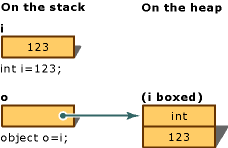以下はチュートリアルではありませんが、C#.Netの基本にすでに精通している開発者向けのチートシートです。
チートシートには「基本」の質問のみが含まれています。「どのように設計しますか...」、「どのアプリケーション層...」などの質問は、チートシートに含まれていません。コメントに記載されているように、質問はジュンにとってより可能性が高いですが、それにもかかわらず、彼らは中間のインタビューで尋ねられます。
コードのフォーマット
例では、簡潔にするために、開き括弧{は改行ではありません。インタビュアーは混乱するかもしれません。C#では、{を新しい行に置くのが通例です。したがって、面接時には一般的なフォーマットを使用することをお勧めします。
スタックとヒープ、値型と参照型
参照型(サンプルクラス、インターフェイス)は大きなヒープに格納されます
値型(int、struct、参照型のインスタンスへの参照の例)は高速スタックに格納されます
値型の割り当て(メソッドへの受け渡し)がコピーされると、参照型は参照によって渡されます(以下の構造体セクションを参照)。
構造体
値型=>割り当てられた(メソッドに渡された)場合、すべてのフィールドとプロパティがコピーされ、nullにすることはできません
継承なし
インターフェイスをサポート
コンストラクターがある場合は、すべてのフィールドとプロパティをコンストラクターに設定する必要があります
interface IMyInterface {
int Property { get; set; }
}
struct MyStruc : IMyInterface {
public int Field;
public int Property { get; set; }
}
class Program {
static void Main(string[] args) {
var ms = new MyStruc {
Field = 1,
Property = 2
};
// value type ,
//
TryChange(ms);
Console.WriteLine(ms.Property);
// ==> ms.Property = 2;
// boxing ( )
IMyInterface msInterface = new MyStruc {
Field = 1,
Property = 2
};
// object (reference type)
// , msInterface
TryChange(msInterface);
Console.WriteLine(msInterface.Property);
// ==> ms.Property = 3;
}
static void TryChange(IMyInterface myStruc) {
myStruc.Property = 3;
}
}
DateTimeは構造体であるため、DateTime型のフィールドでnullをチェックするのは無意味です。
class MyClass {
public DateTime Date { get; set; }
}
var mc = new MyClass();
// false,
// .. DateTime struct (value type) null
var isDate = mc.Date == null;
ボクシング/開封
// boxing (value type, stack -> object, heap)
int i = 123;
object o = i;
// unboxing (object, heap -> value type, stack)
object o = 123;
var i = (int)o;

// boxing
int i = 123;
object o = i;
i = 456;
// ==> .. i, o
// i = 456
// o = 123
// boxing
IMyInterface myInterface = new MyStruct(2);
// boxing i
int i = 2;
string s = "str" + i;
// .. String.Concat(object? arg0, object? arg1)
// unboxing, .. Session Dictionary<string, object>
int i = (int)Session["key"];
string
heap reference type
( ) value type
string a = "hello";
string b = "hello";
// string value type
// ( == )
Console.WriteLine(a == b);
// ==> true
var mc1 = new MyClass { Property = 1 };
var mc2 = new MyClass { Property = 2 };
// reference type
// heap
Console.WriteLine(mc1 == mc2);
// ==> false
const vs readonly
const - =>
readonly -
class MyClass {
public const string Const = "some1";
public readonly string Field = "some2";
}
var cl = new MyClass();
Console.WriteLine(MyClass.Const);
Console.WriteLine(cl.Field);
- dll , :
ref out
ref out new class struct
out ref, ,
struct MyStruc {
public int Field;
}
class Program {
static void Main(string[] args) {
var ms = new MyStruc { Field = 1 };
createNew(ms);
Console.WriteLine(ms.Field);
// ==> ms.Field = 1
var ms2 = new MyStruc { Field = 1 };
createNew2(ref ms2);
Console.WriteLine(ms2.Field);
// ==> ms2.Field = 2
}
static void createNew(MyStruc myStruc) {
myStruc = new MyStruc { Field = 2 };
}
static void createNew2(ref MyStruc myStruc) {
myStruc = new MyStruc { Field = 2 };
}
static void createNew3(out MyStruc myStruc) {
// ,
// myStruc = new
}
}
generic-.
interface IAnimal { }
class Cat : IAnimal {
public void Meow() { }
}
class Dog : IAnimal {
public void Woof() { }
}
// , List -
// , List Add,
// ( . )
List<IAnimal> animals = new List<Cat>();
// , IEnumerable -
// IEnumerable
IEnumerable<IAnimal> lst = new List<Cat>();
Add List:
//
List<Cat> cats = new List<Cat>();
cats.Add(new Cat());
List<Cat> animals = cats;
animals.Add(new Cat());
foreach (var cat in cats) {
cat.Meow(); // cats 2
}
//
List<Cat> cats = new List<Cat>();
cats.Add(new Cat());
List<IAnimal> animals = cats;
animals.Add(new Dog()); // , :
//
foreach (var cat in cats) {
cat.Meow(); // cats 1 1 , Meow()
}
Object
ToString
GetType
Equals
GetHashCode
ToString GetType .
Equals GetHashCode , linq, . , .. .Net. hash .
GetHashCode .
,
class MyClass {
public event Action<string> Evt;
public void FireEvt() {
if (Evt != null)
Evt("hello");
// Evt("hello") -
//
//foreach (var ev in Evt.GetInvocationList())
// ev.DynamicInvoke("hello");
}
public void ClearEvt() {
// MyClass
Evt = null;
}
}
var cl = new MyClass();
//
cl.Evt += (msg) => Console.WriteLine($"1 {msg}");
cl.Evt += (msg) => Console.WriteLine($"2 {msg}");
//
Action<string> handler = (msg) => Console.WriteLine($"3 {msg}");
cl.Evt += handler;
cl.Evt -= handler;
cl.FireEvt();
// ==>
// 1 hello
// 2 hello
//
// "+=" "-="
// MyClass
cl.Evt = null;
Finalizer (destructor) ~
garbage collector
.Net,
struct
finalizer: IDisposable. Dispose finalizer, Dispose. finalizer .
throw vs "throw ex"
try {
...
} catch (Exception ex) {
// , .. CallStack
throw;
// CallStack
throw ex;
}
Garbage collector
. heap , , . Garbage collector. :
( ) -
heap
(Generation 0) - , . Generation 0.
- Generation 1.
Generation 0 , . - Generation 1.
, 2 - Generation 2.
Derived.Static.Fields
Derived.Static.Constructor
Derived.Instance.Fields
Base.Static.Fields
Base.Static.Constructor
Base.Instance.Fields
Base.Instance.Constructor
Derived.Instance.Constructor
class Parent {
public Parent() {
// virtual
//
//
DoSomething();
}
protected virtual void DoSomething() {
}
}
class Child : Parent {
private string foo;
public Child() {
foo = "HELLO";
}
protected override void DoSomething() {
Console.WriteLine(foo.ToLower()); //NullReferenceException
}
}
( , ), . (, , ) - . vs vs .
-
-
- , , )
-
SOLID
Single responsibility - , , God-object
Open closed principle -
Liskov substitution -
Interface segregation principle -
Dependency inversion principle - , ,
3
(: )
(: )
(: )
IDisposable, try, catch, finally
singleton ( lock)
(mutex, semaphore ..)
/ . : . , . . ? ( )?
SQL , HAVING
Stack and heap – .NET data structures
Boxing and Unboxing (C# Programming Guide)